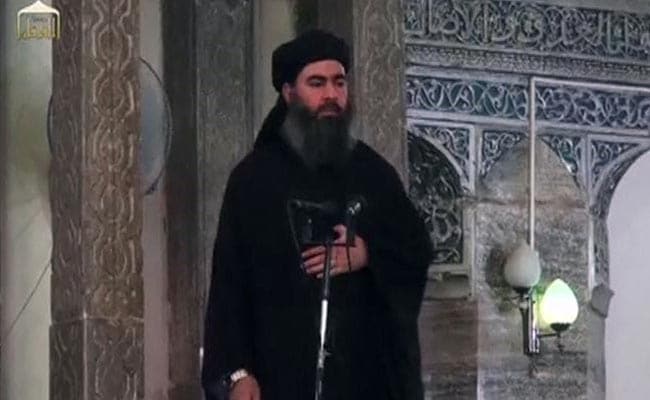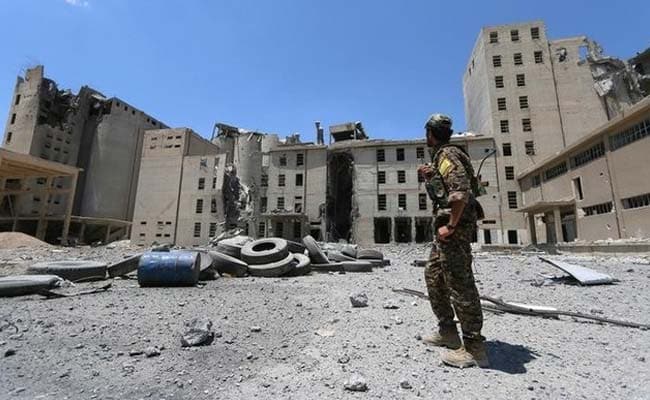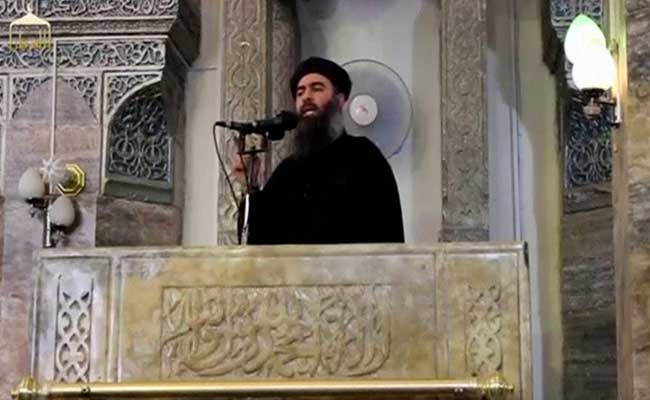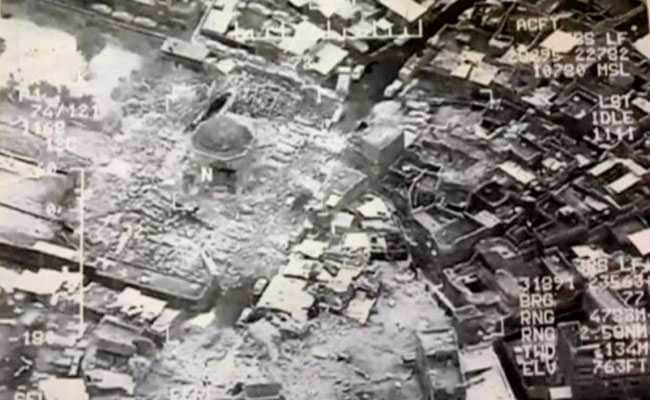New Clues Bolster Belief That ISIS Leader Is Still Alive - And Busy With A Chilling New Mission

His self-declared caliphate was in ruins when Abu Bakr al-Baghdadi summoned some of his top aides to a meeting in eastern Syria last year. The Islamic State's capital in Iraq had already fallen, and its Syrian headquarters was under siege.
Yet the terrorist leader had something else on his mind: schoolchildren.
The gathering near the city of Deir al-Zour was called by Baghdadi personally to discuss rewriting the terrorist group's educational curriculum, according to an Islamic State official who was arrested in a joint operation by Turkish and Iraqi officials earlier this year. Despite the group's dire circumstances, Baghdadi wanted to examine a subject that had less to do with immediate survival than with preserving the organization's ideological core.
"Several top leaders were present, as well as the curricula committee, which I headed," the captured officer, known as Abu Zaid al-Iraqi, said in a videotaped statement aired on Iraqi television.
The meeting, said to have occurred in mid-2017, was the third convening of a committee that had been a pet project of the man at the top, having been "established by caliph Abu Bakr al-Baghdadi," the officer said.
The incident provides a rare glimpse into the secluded life of the Islamic State's leader, a man who has allowed himself to be photographed only once, in July 2014, and has spoken publicly only a handful of times since then. His prolonged absences have given wings to countless false reports portraying Baghdadi as either dead, or gravely wounded and incapacitated.
Despite such rumors, U.S. counterterrorism officials are convinced that Baghdadi is alive and is helping direct long-term strategy for the dwindling numbers of Islamic State fighters defending the group's remaining strongholds in eastern Syria. The U.S. view is supported by intelligence intercepts and detainee interrogations, as well as writings and statements by operatives within the terrorist group's network.
The evidence, while spotty and difficult to confirm, depicts a leader who has opted to make himself invisible, even within his organization - a decision that has drawn complaints from followers and arguably undercuts his ability to rally his beleaguered forces, terrorism experts say.
But the intercepts and reports also suggest that Baghdadi has shifted his attention in recent months to crafting an ideological framework that will survive the physical destruction of the caliphate in Iraq and Syria. In addition to his effort to revamp the group's school curriculum, Baghdadi appears to have been behind a series of missives in recent months that sought to settle ideological disputes between factions of Islamic State fighters.
Viewed together, such actions convey the impression of a disciplined retreat, with Baghdadi helping manage preparations for a shift from caliphate to underground insurgency and international terrorist movement, current and former U.S. officials said.
"Even as they were losing Mosul and Raqqa, we were seeing indications that they were planning to operate anew, as a clandestine organization," said Nicholas Rasmussen, who served as director of the National Counterterrorism Center before stepping down in December. "As they were being driven out of these places, they were leaving behind a kind of cell structure."

The Syrian army has active front lines with ISIS in Raqqa province and has made recent gains there (Reuters File)
The essential strategy also was confirmed by a self-proclaimed Islamic State operative contacted by The Washington Post through an encrypted messaging service. The operative said Baghdadi - a university professor before becoming a terrorist - and other top leaders decided early on to prioritize the indoctrination of children and recruits, both inside Iraq and Syria and also abroad, through the Internet. The effort gained additional urgency as it became clear that the group's Islamist enclave would not survive, he said.
"The leadership is convinced that, even if the State has disappeared, as long as they can influence the next generation through education, the idea of the caliphate will endure," said the operative, who agreed to an interview on the condition that his name not be revealed.
Under Baghdadi's direction, "the values of the caliphate would be seeded in the Umma [Islamic community], and not disappear," the operative said, "even if the caliphate would."
- - -
The meeting last year in Deir al-Zour was one of a handful of reported appearances by a terrorist leader who has been remarkably successful in staying out of sight. Since July 4, 2014, when Baghdadi entered a Mosul mosque to declare the establishment of the Islamic State, there have been more false reports about his death than confirmed sightings or public pronouncements.
In media accounts, Baghdadi has been killed or gravely injured at least a half-dozen times since 2014. He was said to have died in three different aerial bombings, carried out by Russian or U.S. warplanes. Other reports claimed variously that he had been arrested by Syrian troops, mortally wounded in an artillery strike, and poisoned by assassins.
Last June, after a Russian official claimed that Moscow was nearly "100 percent certain" of Baghdadi's death, the Pentagon demurred, citing a lack of confirming evidence. More recently, U.S. officials have expressed confidence that Baghdadi survived his group's defeat in Mosul and Raqqa and remains active, though his exact whereabouts are uncertain.
"By all indications, he's alive," said a U.S. counterterrorism official, speaking on the condition of anonymity to discuss intelligence assessments. "We think he's still coordinating, still helping to run the organization."

In late 2016, the raising of the bounty for Baghdadi's capture - from $10 million to $25 million - triggered a flurry of reported sightings, none of which panned out. Since then, there have been few credible reports about his specific movements and activities, the official acknowledged. "Our best guess is that he is still in Syria, in one of the remaining parts of the country still controlled by ISIS," the official said. ISIS is a common acronym for the Islamic State.
In recent weeks, Baghdadi's presumed final sanctuary has looked slightly less precarious. A Kurdish-led offensive to liberate terrorist-held villages in eastern Syria ground to a halt earlier this spring after the Kurds were forced to defend themselves against Turkish attacks elsewhere in the country. The resulting lull allowed Baghdadi's men to refortify their positions and bring in supplies and reinforcements, U.S. and Middle Eastern intelligence officials said. With fewer U.S. warplanes in the skies to pick them off, small convoys of fighters departed the Damascus suburbs for Islamic State bastions in southern and eastern Syria, safely crossing large expanses of desert under deals struck with the Syrian government, the official said. Intensive airstrikes have since resumed.
"They [Islamic State forces] have definitely regrouped," the U.S. counterterrorism official said. "The pause gave them an opportunity to do that."
Still, the lull has only delayed what by all indications is an inevitable defeat. The Islamic State has suffered a nearly unbroken string of military defeats since late 2015. Yet, throughout this time, its leader has been remarkably silent, never appearing in public to rally his forces and only occasionally releasing an audiotaped message encouraging his troops to fight on. The last of these surfaced on Sept. 28, 2017, about two weeks before the fall of Raqqa.
- - -
Some observers see Baghdadi's absence as part of a deliberate strategy within an organization that in recent years has chosen to de-emphasize the importance of individual leaders in advancing the group's ideals.
"A lot of ISIS supporters say that Baghdadi doesn't want to make ISIS all about him," said Cole Bunzel, a Middle East scholar at Princeton University and editor of Jihadica, a scholarly blog about the global jihadist movement. "There has been an effort, in fact, not to elevate any one personality above the organization."
Yet Baghdadi's virtual invisibility during a crucial struggle for the group's survival has stirred controversy within the Islamic State itself. In recent weeks, members of an Islamic State offshoot in Deir al-Zour have posted messages on social media complaining that Baghdadi has removed himself from the field of battle.
"This clearly affects the morale of ISIS and its supporters," said Steven Stalinsky, executive director of the Middle East Media Research Institute, a Washington nonprofit that monitors jihadists' websites. Other supporters have responded to the criticism by renewing their oaths of allegiance to Baghdadi, in what Stalinsky described as a possible "indication that he is, or was, facing challenges to his authority from within."

Still image taken from video shows destroyed Grand al-Nuri Mosque of Mosul in Iraq where ISIS chief declared himself "commander of the faithful"
Baghdadi, who is about 46 and a native of the Iraqi city of Samarra, appears to be willing and able to communicate when he needs to, at least to his scattered lieutenants and senior aides. The captured Islamic State official who led Baghdadi's curriculum committee described being repeatedly summoned by the caliphate leader for group discussions about education, propaganda and other matters. The captured officer is one of five senior aides arrested since February in operations conducted by Iraqis with U.S. and Turkish assistance.
Rasmussen, the former National Counterterrorism Center director, said the slow-but-steady military campaign against the Islamic State has given Baghdadi ample opportunities to develop secure lines of communication and to prepare for the future. Those preparations probably include plotting future terrorist operations and honing a system for persevering and disseminating the group's core ideas after the Islamic State ceases to exist as a caliphate.
"They knew this was happening - it wasn't as though they had a theory of victory where they were going to hold Mosul and Raqqa forever," Rasmussen said. "But the narrative that has underpinned the Sunni extremist project - whether it's al-Qaida or ISIS - is that the mantle is going to be picked up and advanced by some other set of actors. The project may not be tied to the Syria conflict, but it's not going to go away just because ISIS is defeated on the battlefield."
(This story has not been edited by NT staff)
Source: https://www.ndtv.com/world-news/new-clues-bolster-belief-that-isis-leader-is-still-alive-and-busy-with-a-chilling-new-mission-1854576


No comments